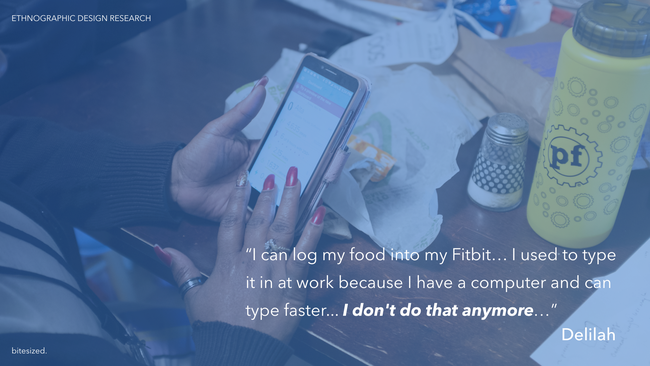Impact: Dietitians and clients
We all know dietary disease is rampant and diet change can be exceedingly difficult for many reasons including time, price, cultural tendencies, and ingrained habits. A dietitian can provide invaluable emotional support and practical guidance. Maintaining support is difficult: dietitians meet with clients sporadically (average: every 4 weeks). At an average appointment, they ask for a food log of the last 24-72 hours. Therefore, they don’t get a comprehensive understanding of their client’s diet, mandating generalized advice.
Bitesized allows dietitians to gain a deeper grasp of their clients’ food habits, and provide personal, culturally-relevant, and specific recommendations on a consistent basis.
Impact: Healthcare
A neuroscientist in pursuit of her PHD got excited when she heard about bitesized. She has been studying what creates optimal brain function, looking at factors of home/work life, community, stress, exercise, hobbies etc. She removed nutrition from her study, knowing it’s a key facet of an optimally functioning brain. She chose to remove it because methods for measuring food intake are largely inaccurate. She liked bitesized because it documents users’ food intake directly before consumption.
Methods of gauging food intake require some level of generalization. For a dietitian it is easier to generalize a plate of food than using a metric based approach according to ingredients. No food or person is identical. How food is cooked, quantity, freshness etc. all need to be considered.
As new technologies progress were excited about the opportunities for increased accuracy using photo-analysis of food intake.
Impact: The Environment
The food system is in need of new life, methods, and systems. We produce food in a way that prioritizes efficiency and scale over personal and environmental health. Prioritizing efficiency in food production creates inefficiency in our population. The more we process foods, the less our bodies benefit. It’s an ironic cycle. However, advice from a dietitian will inherently be encouraging users to buy foods that are better for the environment.
Drawdown.org claims to have the most comprehensive plan ever proposed to reverse climate change. A plant-rich diet is the #4 most impactful thing we can do according to their list of solutions. Based on a dietitian’s education they will steer people towards leaner and less meats, as well as more whole grains and vegetables.
